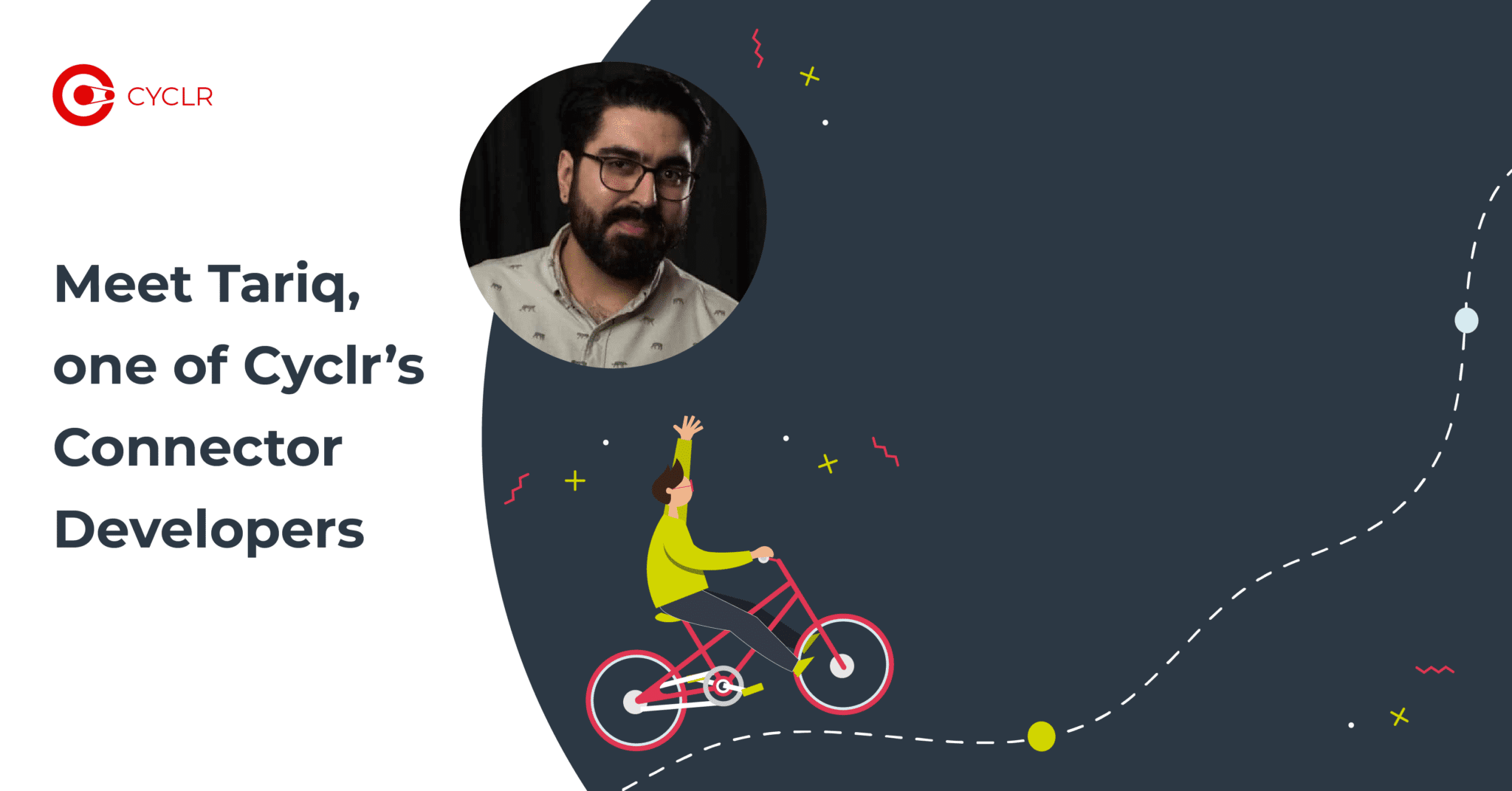
Meet Tariq, a self-taught developer skilled in API Development, Front-End Development, Customer Service and Communication. He is currently working as a Connector Developer at Cyclr and answered some of my questions.
What’s your current role and what do you like about it?
I’m a Connector Developer for Cyclr. My job involves looking at lots of different API documentation and converting and implementing them as connectors for Cyclr Partners to use. My favourite part of my role is collaborating with other team members and developers across the business. I’m also responsible for looking after the Cyclr Training Sandbox – A learning platform for training new starters.
How did you get into Programming?
I’m a self-taught developer and changed careers in 2022. My background is in the Music Industry where I worked for over 6 years. I was in awe of the skill that developers had but I never thought it would be something I was capable of learning until I spoke to a friend of mine who’d made the jump from music to tech and convinced me to give it a try.
What’s your earliest memory of learning to code?
My earliest memory of learning to code was from free online courses on Codecademy and freeCodeCamp in 2020. Before then my only exposure to programmers was what was depicted on movies/TV and video games. I strangely started a course on Git before I’d learned anything about HTML, CSS or JavaScript. I remember being elated when seeing code that I’d written was changing live on a web page.
What’s a programming language that you would build EVERYTHING and ANYTHING in and why?
That’s a hard question to answer and I think if you’d ask 10 different developers, you’d probably get 10 different answers. I think that every programming language has its pros and its drawbacks. Part of what I find interesting about being a developer is learning what experienced senior developers think of the pros and cons of their programming language.
For me, I’d probably say JavaScript because that’s what I’m most comfortable with and it’s the language of the web but I don’t think that by any means it’s the best tool for every project. JavaScript has a lot of unique quirks under the hood which can make it difficult to work with in certain situations, especially when used on the backend. I could see good arguments for someone mentioning Python, Go or Rust. which are languages that I wish to learn in the future.
What’s something you think Software developers do not do enough of?
Communicate and collaborate! I think that a lot of Software developers put a lot of stock in finding elegant solutions to problems that they solved on their own. However, I think that there’s importance in not only being able to problem solve but to being able to communicate and collaborate with others. In tech, people call them ‘Soft Skills’ which is a term I’m not too fond of. But the ability to distil a problem to its bare bones and communicate it effectively to both other developers and non-technical people is invaluable.
What is your least favourite thing about programming?
One thing I battle with is a sense of imposter syndrome. I think it’s common for developers who don’t come from a traditional background. I find the best way for me to combat it is to be open and work together on solving problems.
What’s a technology you’re currently learning or excited to learn?
At the moment I’m diving deeper into JavaScript, I’ve been learning Bun which I think is a great all-in-one tool for JavaScript developers! I’ve mentioned it already but I’d quite like to learn Python, Go, or Rust. as my next programming language. I like the look of the developer experience in Go and the experience of being able to build fast-performing apps with Rust.
Time travel 10 years into the past or 10 years into the future? What does technology look like?
10 years into the future! I think we’re at a really interesting time in software development, I think the next 10-15 years will be definitive in the industry. We are already seeing strives in technology using AI and I think that the tools we use to develop software in the future will be very different. The speed at which we’re seeing progress is fascinating as well. It’s important to keep in mind that AI is always evolving and never as primitive as it is today. Ray Kurzweil has made some interesting predictions for the next 25 years. I think the one about VR feeling close to reality in the 2030s is pretty spot on.
Lastly, what advice would you give to a budding developer?
Don’t be too hard on yourself, you’re doing a great job!
Learning to code is difficult but consistency is key, just like any skill. Make time for yourself to learn and stick to it. When you feel comfortable enough start to build little projects for friends or local businesses. Then before you know it you’ll have a portfolio to show off to others.
Don’t get overwhelmed or discouraged by the amount of knowledge out there, start small and stay consistent!
Meet other Cyclr Team Members
Nik, Cyclr’s COO
Matt, Head of Outbounding
Sophia, QA Engineer